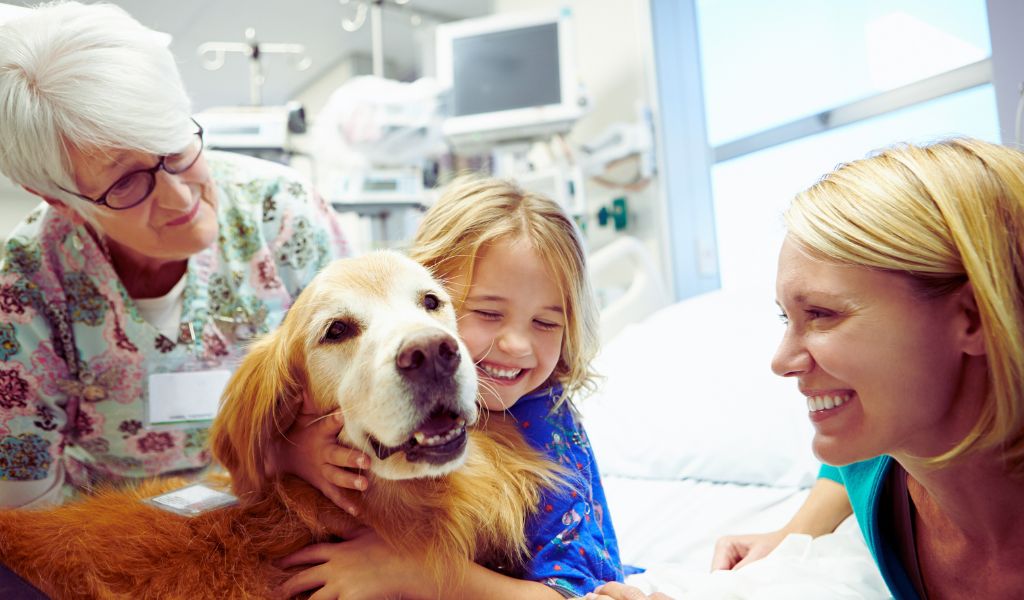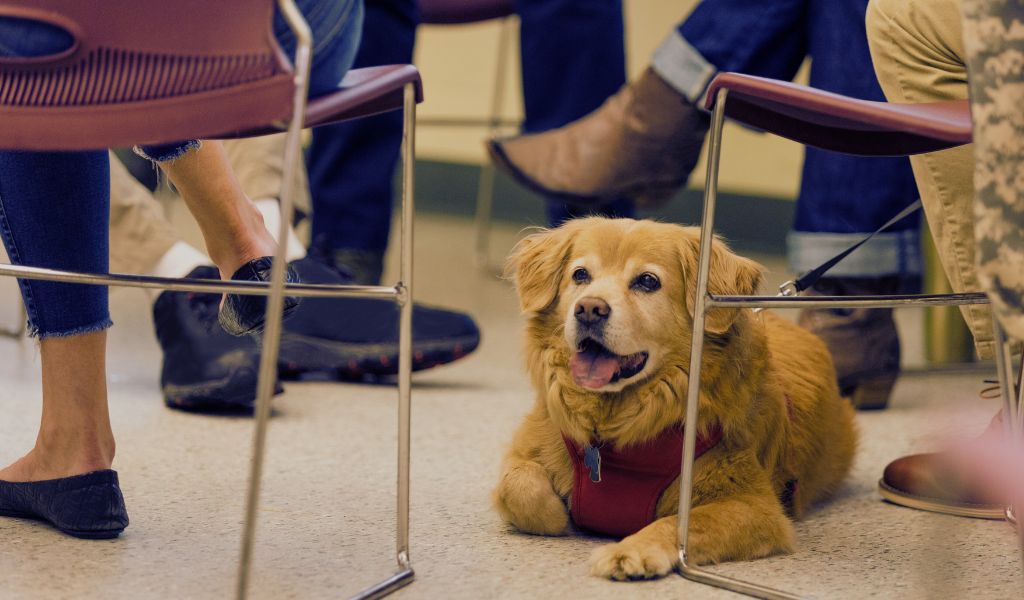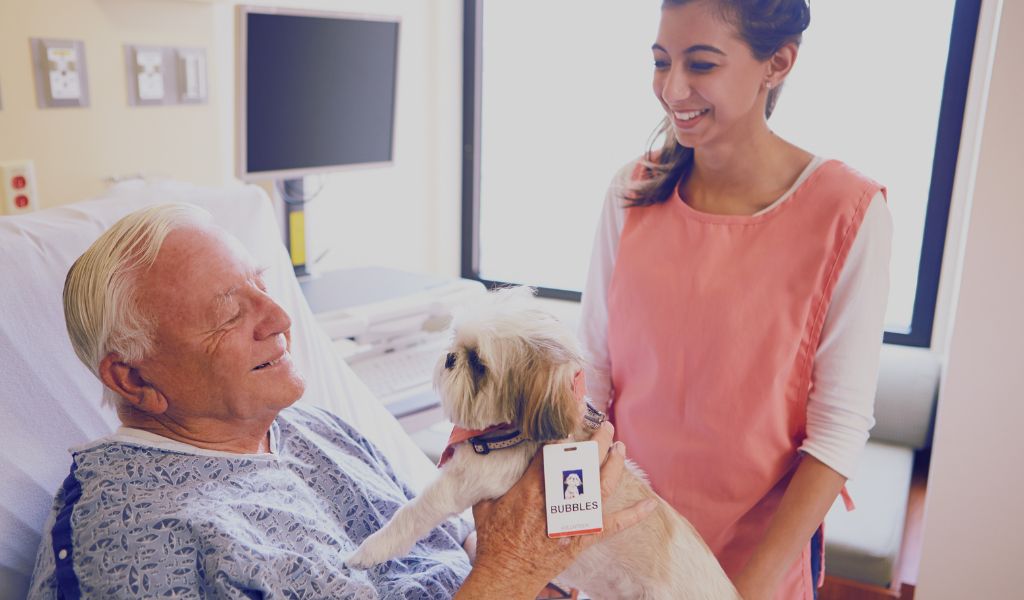Cocker spaniels are known for their friendly and affectionate nature, making them perfect candidates for therapy dog training.
Whether it’s providing comfort to hospital patients or offering emotional support to individuals with special needs, Cocker spaniels can make a significant impact as therapy dogs.
However, training them for this important role requires patience, dedication, and a comprehensive understanding of their unique needs and behaviours.
In this comprehensive guide, we will explore the process of training Cocker spaniels as therapy dogs, from understanding their temperament and socialisation needs to developing the necessary obedience skills.
We’ll also delve into the specific tasks and responsibilities of therapy dogs, as well as the legal and ethical considerations that come with this role.
Whether you’re a professional dog trainer, a Cocker spaniel owner, or someone considering a therapy dog for personal or professional use, this guide will provide you with the knowledge and resources needed to support and train Cocker spaniels as therapy dogs.

Understanding the Role of Therapy Dogs in Health and Wellness
Therapy dogs play a vital role in promoting health and wellness in various settings.
These specially trained canines provide comfort, companionship, and emotional support to individuals in hospitals, nursing homes, schools, and disaster relief areas.
Their presence has been shown to reduce stress, anxiety, and feelings of loneliness, which can have a positive impact on mental and emotional well-being.
Interactions with therapy dogs can also help lower blood pressure, improve cardiovascular health, and boost the release of endorphins, which are natural mood elevators.
In addition, these dogs can help individuals develop socialisation and communication skills, especially for those with disabilities or mental health conditions.
Overall, therapy dogs offer a unique form of non-judgmental support and can contribute significantly to the overall health and wellness of individuals in a variety of settings.
Their comforting presence and unconditional love make them a valuable asset in promoting well-being.

Benefits of Training Cocker Spaniels as Therapy Dogs
Training Cocker spaniels as therapy dogs can have numerous benefits.
These dogs are known for their friendly and gentle nature, making them great companions for those in need of emotional support.
Cocker spaniels are also highly adaptable, making them suitable for various environments, such as hospitals, nursing homes, schools, and rehabilitation centres.
Their small size and affectionate demeanour make them approachable and comforting to people of all ages.
Additionally, their obedience and intelligence make them easy to train for specific therapy tasks, such as providing comfort to individuals with anxiety or depression.
The presence of a trained Cocker spaniel can help reduce stress and anxiety in patients, improve social interactions, and even encourage physical activity.
Overall, training Cocker spaniels as therapy dogs can greatly enhance the well-being of individuals in need, while also bringing joy and comfort to those they interact with.
Characteristics of Cocker Spaniels for Therapy Work
As well as their gentle and affectionate nature, Cocker spaniels are also incredibly intuitive and can sense when their presence is needed, making them ideal for therapy work.
They are highly trainable and eager to please, making them quick to learn and adaptable in various therapy settings.
Their medium size and manageable energy level also make them a practical choice for therapy work, as they are not too overwhelming for clients and can easily navigate different environments.
Overall, the gentle and sociable nature of Cocker spaniels makes them excellent candidates for providing therapeutic support to those in need.

Getting Started: Basic Training for Cocker Spaniels
Getting started with basic training for Cocker spaniels is crucial for a well-behaved and well-adjusted pet and will be needed if your dog is to become a well-behaved therapy dog.
Start with teaching your pup their name and getting them used to the concept of commands.
Positive reinforcement, such as treats and praise, will help cement good behaviour.
Make sure to socialise your Cocker spaniel with other dogs and people early on to prevent any potential aggression or fear.
Basic commands like sit, stay, and come are essential for their safety and your peace of mind.
Consistency is key when it comes to training, so be patient and persistent. Cocker spaniels are eager to please, so training can be a rewarding experience for both you and your pet.
Seek out professional help if you encounter any difficulties, as proper training will ensure a happy and well-behaved Cocker spaniel for years to come and will put him well on the way to becoming a competent therapy dog.
Advanced Training Techniques for Therapy Dog Skills
Advanced training techniques for therapy dog skills involve building on the foundational obedience and socialisation training that all dogs receive.
This includes exposure to various environments, distractions, and situations that they may encounter while being a therapy dog.
Advanced techniques may include scent work training to help dogs interact with patients suffering from sensory impairments, as well as advanced obedience and control training to ensure the therapy dog can remain calm and focused in challenging situations.
Additionally, therapy dogs may receive training in specialised skills such as providing deep pressure therapy, assisting with balance and mobility, or even learning to recognise and respond to specific cues from their handler.
These advanced techniques require a high level of dedication from both the dog and their handler, as well as ongoing practice and reinforcement to maintain these skills.
Ultimately, advanced training techniques for therapy dog skills help to ensure that therapy dogs are well-prepared to provide comfort, support, and assistance to those in need.
Essential Obedience Training for Therapy Work
Essential obedience training is crucial for any dog that will be participating in therapy work.
These dogs need to be well-behaved, reliable, and able to follow commands in a variety of settings.
Basic commands such as sit, stay, come, and down are essential for a therapy dog to have in their repertoire.
They also need to be comfortable walking on a leash without pulling, behaving calmly around other people and animals, and being able to handle being touched and petted by strangers.
Obedience training not only ensures that the dog will be able to perform their duties effectively, but also helps to create a calm and confident demeanour, which is essential for therapy work.
It also establishes a strong bond of trust and communication between the dog and their handler, reinforcing the teamwork necessary for successful therapy interactions.
Overall, essential obedience training is the foundation for a successful and effective therapy dog.
Socialisation and Desensitisation Exercises for Therapy Dogs
Socialisation and desensitisation exercises are important components of training for therapy dogs.
Socialisation helps the dog become comfortable in a variety of environments and with different types of people, while desensitisation helps the dog become accustomed to and unfazed by loud noises, sudden movements, and other potentially stressful stimuli.
These exercises are crucial for therapy dogs, as they often work in diverse and unpredictable settings such as hospitals, nursing homes, or schools.
By exposing the dog to different situations in a controlled and positive manner, trainers can ensure that the dog remains calm and focused during therapy sessions.
Through proper socialisation and desensitisation, therapy dogs can develop the confidence and adaptability necessary to provide comfort and support to those in need.
In addition, these exercises help to ensure the safety and well-being of both the therapy dog and the individuals they are interacting with, creating a positive and effective therapeutic experience for all involved.
Health and Wellness Management for Therapy Dogs
Health and wellness management for therapy dogs is essential in ensuring that they are able to perform their duties effectively.
This includes regular check-ups with a veterinarian, proper nutrition, exercise, and mental stimulation.
Therapy dogs often work in a variety of environments and are exposed to different stressors, so it’s important to keep them physically and mentally healthy.
Additionally, it’s crucial for therapy dog handlers to be knowledgeable about the signs of stress or illness in their dogs, and to understand how to provide appropriate care when needed.
Regular grooming and dental care are also important aspects of health management for therapy dogs, as they need to be clean and well-groomed when interacting with individuals in hospitals, nursing homes, and other facilities.
By prioritizing the health and wellness of therapy dogs, they are better able to provide comfort and support to those in need, and can continue their work as valuable members of therapy programs.
Preparing for Therapy Dog Evaluation and Certification
Preparing for a therapy dog evaluation and certification requires both the dog and the handler to undergo specific training and preparation.
It is essential for the dog to be well-behaved, calm, and capable of interacting with a variety of people and environments.
The handler must also be trained in how to properly handle and manage the dog during therapy sessions.
Before the evaluation, it is important for the handler and dog to participate in obedience training, as well as practice basic commands and socialisation in various settings.
Additionally, the dog should be familiar with common therapy dog tasks, such as walking on a loose leash, greeting strangers politely, and remaining calm around medical equipment and loud noises.
The evaluation itself may include tests of the dog’s manners, obedience, and ability to stay calm in different scenarios.
The certification process typically involves a formal assessment of the dog’s skills and temperament, as well as the handler’s ability to effectively manage the dog during therapy visits.
Creating a Successful Therapy Dog Visit Routine
Creating a successful therapy dog visit routine involves a combination of proper training, preparation, and understanding the needs of the individuals being visited.
The first step is to ensure that the therapy dog is well-trained and suitable for the environment in which they will be visiting.
This includes socialisation with different people and animals, as well as obedience training to ensure they can calmly navigate various settings.
It’s also important for the handler to be well-prepared, with a clear understanding of the goals of each visit and the specific needs of the individuals they will be interacting with.
Additionally, having a consistent routine for each visit can help the therapy dog and handler establish a sense of familiarity and ease for both themselves and the individuals they are visiting.
Finally, being flexible and adaptable during visits is key, as each individual and setting may require different approaches.
By combining training, preparation, and understanding, a successful therapy dog visit routine can provide meaningful support and comfort to those in need.
Understanding Legal and Ethical Considerations for Therapy Dog Teams
Therapy dog teams provide valuable support and comfort to individuals in a variety of settings, but it’s crucial for these teams to understand the legal and ethical considerations associated with their work.
From a legal standpoint, therapy dog teams must adhere to laws related to animal behavior and welfare, as well as liability and consent.
It’s important for teams to be aware of the specific regulations and requirements in the locations where they will be providing therapy services.
Additionally, teams must also consider the ethical implications of their work, including issues related to confidentiality, boundaries, and cultural sensitivity.
These considerations are essential for maintaining the well-being and safety of both the therapy dog and the individuals they are serving.
By being knowledgeable about the legal and ethical aspects of their work, therapy dog teams can ensure that they are providing effective and responsible support to those in need.
Creating a Supportive Environment for Therapy Dog Training
Creating a supportive environment for therapy dog training is crucial for the success of both the dog and the handler.
This environment should be free from distractions and provide a safe space for the dog to learn and practice new skills.
Positive reinforcement, patience, and consistency are key components of creating this supportive atmosphere.
Handlers should also ensure that their own stress and anxiety are managed, as dogs can often pick up on human emotions.
It’s important for the handler to be calm and confident during training sessions.
Establishing a routine and clear expectations can also help create a supportive environment for therapy dog training.
This includes setting aside dedicated time for training and being consistent with commands and boundaries.
Lastly, creating a bond of trust and mutual respect between the handler and the dog is essential for therapy dog training.
By fostering a supportive environment, both the dog and the handler can thrive in their roles during therapy sessions.
Training Cocker Spaniels as Therapy Dogs: FAQs
What makes Cocker spaniels suitable as therapy dogs?
Cocker spaniels are known for their affectionate and eager to please nature, making them perfect candidates for therapy work. Their adaptable and sociable temperament allows them to form strong bonds with individuals, making them ideal for providing comfort and companionship.
What are the key characteristics of the Cocker spaniel breed?
The cocker spaniel breed is characterized by their playful and energetic nature, silky coats, and variety of colours. They are known for being affectionate, social, and adaptable to various environments, making them an excellent choice for a therapy dog.
How do Cocker spaniels benefit from socialisation and training early on?
Socialisation and training early are crucial for Cocker spaniels to develop into well-adjusted therapy dogs. This exposes them to different people, environments, and experiences, helping them build confidence and adaptability.




